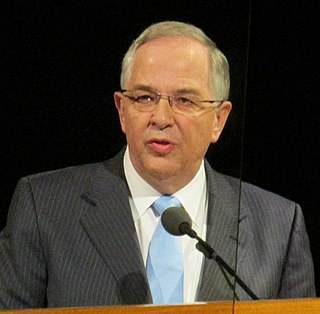A Quote by William Butler Yeats
We must not make a false faith by hiding from our thoughts the causes of doubt, for faith is the highest achievement of the human intellect, the only gift man can make to God, and therefore it must be offered in sincerity.
Related Quotes
Whatever God can do faith can do, and whatever faith can do prayer can do when it is offered in faith. An invitation to prayer is, therefore, an invitation to omnipotence, for prayer engages the Omnipotent God and brings Him into our human affairs. Nothing is impossible to the man who prays in faith, just as nothing is impossible with God. This generation has yet to prove all that prayer can do for believing men and women.
Faith, to be faith, must center around something that is not known. Faith, to be faith, must go beyond that for which there is confirming evidence. Faith, to be faith, must go into the unknown. Faith, to be faith, must walk to the edge of the light, and then a few steps into the darkness. If everything has to be known, if everything has to be explained, if everything has to be certified, then there is no need for faith. Indeed, there is no room for it.
As soon as we ask what faith is and what sort of mistreatment of faith causes doubt, we are led to the first major misconception about doubt-the idea that doubt is always wrong because it is the opposite of faith and the same thing as unbelief. What this error leads to is a view of faith that is unrealistic and a view of doubt that is unfair.
Yet, after all, faith is not our righteousness. It is accounted to us in order to righteousness (Rom 4:5, GREEK), but not as righteousness; for in that case it would be a work like any other doing of man, and as such would be incompatible with the righteousness of the Son of God; the righteousness which is by faith. Faith connects us with the righteousness, and is therefore totally distinct from it. To confound the one with the other is to subvert the whole gospel of the grace of God. Our act of faith must ever be a separate thing from that which we believe.
The gift of faith is a priceless spiritual endowment... Our faith is centered in God our Father, and Jesus Christ, our Savior and Redeemer. It is bolstered by our knowledge that the fullness of the gospel has been restored to the earth; that the Book of Mormon is the word of God; and that prophets and apostles today hold the keys of the priesthood. We treasure our faith, work to strengthen our faith, pray for increased faith, and do all within our power to protect and defend our faith.
So for us, the condition and preparation on and by which we are sheltered by that great hand, is the faith that asks, and the asking of faith. We must forsake the earthly props, but we must also believingly desire to be upheld by the heavenly arms. We make God responsible for our safety when we abandon other defense, and commit ourselves to Him.
Take faith, for example. For many people in our world, the opposite of faith is doubt. The goal, then, within this understanding, is to eliminate doubt. But faith and doubt aren't opposites. Doubt is often a sign that your faith has a pulse, that it's alive and well and exploring and searching. Faith and doubt aren't opposites, they are, it turns out, excellent dance partners.
We don't always possess faith in the sense of having a clear embodiment of something to hang on to. The relationship between the intellect and faith is a very curious one. Sometimes the intellect can point us to faith, sometimes the intellect can stand in the way of faith. Sometimes, as St John of the Cross points out, we have to darken or blind the intellect in order to have faith.
Faith is indeed the energy of our whole universe directed to the highest form of being. Faith gives stability to our view of the universe. By faith we are convinced that our impressions of things without are not dreams or delusions, but, for us, true representations of our environment. By faith we are convinced that the signs of permanence, order, progress, which we observe in nature are true. By faith we are convinced that fellowship is possible with our fellow man and with God.
If we rely on anything else besides faith to maintain the practice of the presence of God, we will certainly fail, whether this is our feelings, or experiences, or sincerity, or good intentions, or reasonings, or plans. The reason these things will fail while faith will not fail is that all these things depend on us, while faith depends on God. It is a gift of God.






































